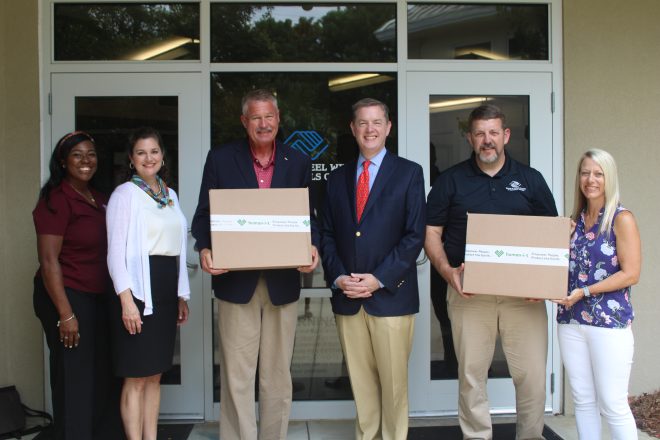Hopelessness is not God’s plan
Published 4:57 pm Thursday, October 31, 2024
By Ann Nunnally
Many silent souls will go to work today, run their households, or volunteer at a local charity while bearing the pain of hopelessness in some area of their lives. What is the root of this quiet pain and is there a Biblical answer?
The word hopeless is defined as “having no expectation of good or success” or “incapable of solution, management or accomplishment: impossible.”
Hope is the expectation or blueprint for good or success. Just as a builder reads a carefully prepared blueprint before he starts laying the foundation and erecting walls for a building, hope serves as life’s blueprint. Hope helps us see the big picture or the final product.
In their book, “Hope in the Age of Anxiety” authors Anthony Scioli and Henry Biller list the following nine areas where we experience hopelessness. (Google.books.com)
1. Alienation – Alienated individuals believe that they are somehow different. Moreover, they feel as if they have been cut loose, and no longer deemed worthy of love, care, or support. In turn, the alienated tend to close themselves off, fearing further pain and rejection.
2. Forsakenness – The word “forsaken” refers to an experience of total abandonment that leaves individuals feeling alone in their time of greatest need. Recall Job in the Old Testament, crumpled over and covered with sores, pleading with a seemingly indifferent God.
3. Uninspired – Feeling uninspired can be especially difficult for members of underprivileged minorities, for whom opportunities for growth and positive role models within the group may be either lacking or undervalued.
4. Powerlessness – Individuals of every age need to believe that they can author the story of their life. When that need is thwarted, when one feels incapable of navigating one’s way toward desired goals, a feeling of powerlessness can set in.
5. Oppression – Oppression involves the subjugation of a person or group…. The word “oppressed” comes from Latin, to “press down,” and its synonym, “downtrodden,” suggests a sense of being “crushed under” or “flattened.”
6. Limitedness -When the struggle for survival is combined with a sense of failed mastery, individuals feel limited. They experience themselves as deficient, lacking the right stuff to make it in the world. This form of hopelessness is all too common among the poor as well as those struggling with severe physical handicaps or crippling learning disabilities.
7. Doom – Individuals weighed down by this form of despair presume that their life is over, that their death is imminent. The ones most vulnerable to sinking into this circle of hell are those diagnosed with a serious, life-threatening illness as well as those who see themselves worn out by age or infirmity. Such individuals feel doomed, trapped in a fog of irreversible decline.
8. Captivity – Two forms of hopelessness can result from captivity. The first consists of physical or emotional captivity enforced by an individual or a group. Prisoners fall into this category as well as those who help a captive in a controlling, abusive relationship. We refer to this as “other imprisonment.” An equally insidious form of entrapment is “self-imprisonment. This occurs when individuals cannot leave an unhealthy relationship because their sense of self will not allow it.
9. Helplessness – Helpless individuals no longer believe that they can live safely in the world. They feel exposed and vulnerable, like a cat after being declawed or a bird grounded by a broken wing. Trauma or repeated exposure to uncontrolled stressors can produce an ingrained sense of helplessness. In the words of one trauma survivor, “I was terrified to go anywhere on my own … I felt so defenseless and afraid that I just stopped doing anything.”
Most of us have experienced one or more of these areas of hopelessness during our lifetime. How do we as Christians rise above hopelessness?
The Bible says many things about the importance of hope. Here are a few scriptures that will help us understand hope and hopelessness.
“Hope deferred makes the heart sick, but a dream fulfilled is a tree of life.” Proverbs 13:12 NLT
“Through Christ, you have come to trust in God. And you have placed your faith and hope in God because he raised Christ from the dead and gave him great glory.” 1 Peter 1:21 NLT
“Even when there was no reason for hope, Abraham kept hoping–believing that he would become the father of many nations. For God had said to him, “That’s how many descendants you will have!” Romans 4:18 NLT
“Three things will last forever–faith, hope, and love–and the greatest of these is love.” 1 Corinthians 13:13 NLT
“I pray that God, the source of hope, will fill you completely with joy and peace because you trust in him. Then you will overflow with confident hope through the power of the Holy Spirit.” Romans 15:13 NLT
In the preceding verses, we can determine four things: God is the source of hope, hope, and trust in God work together, having no hope will make you sick and finally, hope is an anointing that remains forever just like faith and love.
It’s time to reconfigure your blueprint for life using the ink of trust and the paper of God’s faithfulness and love toward us.





